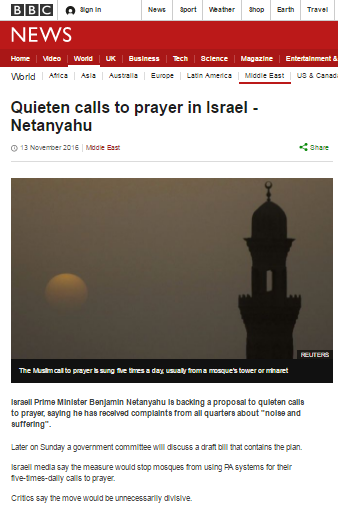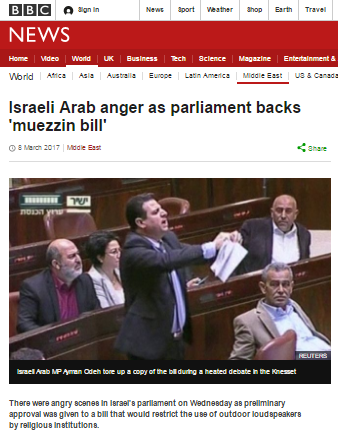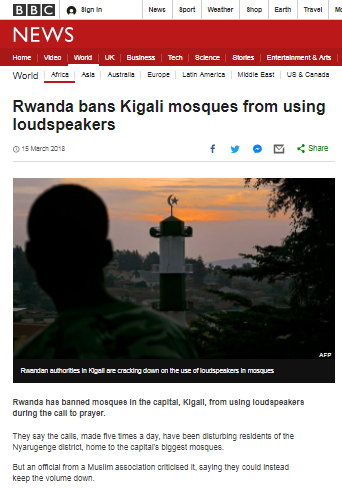On November 13th 2016 the BBC News website published a report titled “Quieten calls to prayer in Israel – Netanyahu” (discussed here) in which a draft bill proposing to limit the use of loudspeakers by religious institutions was described as “unnecessarily divisive” and readers were told that:
“Nasreen Hadad Haj-Yahya from the Israel Democracy Institute, a thinktank, wrote in a local newspaper that “the real aim is not to prevent noise but rather to create noise that will hurt all of society and the efforts to establish a sane reality between Jews and Arabs”.”
The next day – November 14th 2016 – another report (discussed here) on the same story appeared on the BBC News website under the headline “Israeli bills draw Palestinian warning“.
“A senior Palestinian official has said his government will go to the UN to stop what he called a series of “escalatory measures” by Israel.
Nabil Abu Rudeina said Israeli plans to […] quieten calls to prayer, will “bring disasters to the region”. […]
The Palestinian Minister of Waqf and Religious Affairs, Youssef Ideiss, said the plan threatened a “religious war”, the Jerusalem Post newspaper reported.”
On March 8th 2017 the BBC News website published yet another report (discussed here) on the same subject – “Israeli Arab anger as parliament backs ‘muezzin bill’“.
“Two versions of the so-called “muezzin bill”, which would mostly affect Muslim calls to prayer, passed their first readings by slim majorities.
Some Arab MPs ripped apart copies of the legislation during a debate. […]
The bill’s critics say it as an attack on religious freedom.
“The voice of a muezzin has never caused any environmental noise. It is about an important Islamic religious ritual, and we have never in this house intervened in any religious ceremony related to Judaism. Your action is a racist slur,” warned Ahmed Tibi of the Arab-dominated Joint List alliance during the debate.
“Your intervention strikes at the very souls of Muslims,” he added.”
On March 15th 2018 an article appeared on the BBC News website’s Africa page under the headline “Rwanda bans Kigali mosques from using loudspeakers“.
In contrast to the headline in the third BBC report from Israel, that title does not suggest that muezzin themselves are the target of the ban rather than loudspeakers.
Readers of the report from Rwanda were not told that the ban is “unnecessarily divisive” or a “disaster” or a “racist slur” or that it would “hurt society”. They did not see the move portrayed as part of a “religious war” or an “attack on religious freedom” or something that “strikes at the very souls of Muslims”.
Here is how the BBC did present the story to its audiences:
“Rwanda has banned mosques in the capital, Kigali, from using loudspeakers during the call to prayer.
They say the calls, made five times a day, have been disturbing residents of the Nyarugenge district, home to the capital’s biggest mosques.
But an official from a Muslim association criticised it, saying they could instead keep the volume down.”
Readers also found the following analysis:
“Today’s noise pollution concerns have silenced the loudspeakers on Kigali’s mosques. But it would be wrong to say that Muslims are being targeted. They can still go to mosques and pray five times a day.”
It would be difficult to find a clearer example of double standards in BBC reporting.
Related Articles:
Superficial BBC reporting on proposed legislation – part 1
Superficial BBC reporting on proposed legislation – part 2
Third context-free BBC article on proposed legislation



